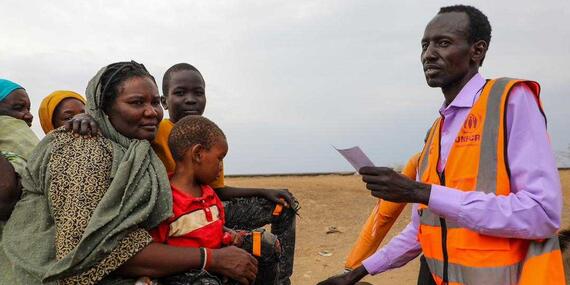Today's top news: Sudan, Ukraine

Sudan
Martin Griffiths’ travel
Under-Secretary-General for Humanitarian Affairs and Emergency Relief Coordinator, Martin Griffiths, has wrapped up his visit to Port Sudan. He is en route to Nairobi to continue discussions on practical solutions to the massive humanitarian challenges Sudan faces.
Humanitarian response
The World Health Organization has verified further attacks on health care in Sudan. So far, 28 incidents have been verified, leading to 8 deaths and 18 injuries among health care personnel. More reports are under verification. Seventeen of these attacks have affected health care facilities, including laboratories.
The types of attacks include looting, obstruction of access to health care, violent attacks using weapons, and the forced occupation of facilities.
The safety and sanctity of health care must be protected at all times, especially in situations of deadly violence, when they are needed most.
Meanwhile, we and our humanitarian partners are working to deliver assistance to those in need in Sudan wherever and whenever it is feasible to do so.
On Wednesday, the World Food Programme resumed its lifesaving operations. A first set of distributions is underway to reach 22,000 people in Gedaref state.
The UN Population Fund (UNFPA) continues to support vulnerable women and girls in Sudan. UNFPA partners are making sure that supplies for safe births and reproductive health needs – which had been distributed before this crisis – reach hospitals and functioning health facilities.
Some 90 community midwives trained by UNFPA are helping pregnant women deliver safely, mainly at home, in the capital Khartoum.
The International Organization for Migration (IOM) says it has set up six warehouses across five states in Sudan. IOM has pre-positioned more than 10,000 core relief kits across the country. The agency is looking at options to set up additional supplies in and around Port Sudan.
Impact on neighbours
In a statement, IOM commended neighbouring countries for keeping their borders open to those fleeing Sudan and calls for increased efforts to improve conditions at border points.
Our humanitarian colleagues tell us that more than 11,000 people have crossed into Ethiopia from Sudan as of 3 May. Partners are providing emergency health services, drinking water, sleeping mats, high-energy biscuits, and transportation.
In Chad, the UN Refugee Agency (UNHCR) estimates that some 30,000 people have crossed the border from Sudan. UNHCR says they are being provided with food, water, health services and other supplies.
And in the Central African Republic, the Humanitarian Coordinator Mohamed Ag Ayoya today traveled to Am-Dafock on the Sudanese border with UN agency heads and government officials. The UN is scaling up its humanitarian response there to meet the needs of some 9,700 people who have arrived from Sudan.
The UN Humanitarian Air Service has today transported 4.6 tons of emergency cargo from the capital Bangui to Birao, near Am-Dafock. The supplies from five UN agencies included medicine, water and shelter supplies and other essential items.
Ukraine
We are extremely concerned for the plight of civilians after almost a week of nightly airstrikes and attacks which have killed and injured dozens of people.
Critical infrastructure has also been destroyed, adding to the country's already dire humanitarian situation.
The Humanitarian Coordinator ad interim Matthew Hollingworth expressed alarm on Twitter over the many casualties in Kherson yesterday when a train station and a supermarket were hit during the busiest hours of the day.
In the east, a power plant was reportedly hit in a town close to the front line, in the Donetsk region, cutting energy for around 100,000 consumers and critical services such as hospitals and schools, according to the Government of Ukraine.
Our colleagues on the ground also warn about the humanitarian crisis in the area surrounding Marinka, in the Donetsk region. Here, some 5,000 civilians – according to the colleagues– are enduring heavy ground fighting and hostilities that have escalated over the past two months.
